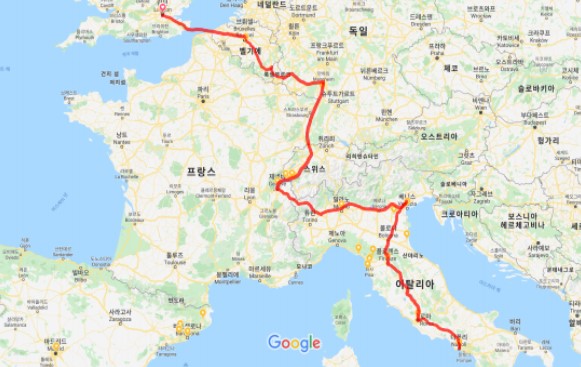
1. BL article on the Canto III of the Childe Harold's Pilgrimage.
"Lord Byron wrote his third canto of Childe Harold as he travelled through Belgium and up the Rhine to Switzerland, having left England under a cloud of public disapproval. The theme of rejection and failure, and the poetĄ¯s reactions to these, are a strong theme running through the work: Byron/Harold (the distinction between them is blurred in this canto) leaves England keenly feeling his separation from his muse and daughter. A visit to Waterloo inspires thoughts of frustration at the vanity of NapoleonĄ¯s military ambition, contrasted with praise for an English officer, but these ultimately lead to despair at the futility of war. Yet Byron feels moved to praise two battles that supported political independence (Morat and Marathon), and a young French soldier killed in the defence of his homeland. As the poetĄ¯s journey terminates in Switzerland he is led to praise Rousseau. Through the course of the poem Nature reflects the poetĄ¯s turmoil, the mountains, avalanches, glaciers and storms being seen as a realisation of the sublime."
2. An agonizing expression of inner turmoil(the separation scandal etc)
3. Byron's own comment:"[I]t is a fine indistinct piece of poetic desolation, and my favourite. I was half mad during the time its composition, between metaphysics, mountains, lakes, love inextinguishable, thoughts unutterable, and the nightmare of my own delinquencies."
4. His comparison of Napoleon(at Waterloo), Rousseau(in front of the Swiss landscape) with himself: "the artist as a suffering hero."
5. His intense but vain desire to condense into one word with all the force of lightning all the contradictory elements of his selfhood: "Soul, heart, mind, passions, feelings, strong or weak.' But Byron's lightning is not self-consuming passion, but weapon made of language he wishes he could wield against his enemy.
6. A Few Stanzas to read
5-7: Self-reflection on Harold
12, 15-16: On himself as the narrator of this poem
97: On Poetic Composition
| |
| |
|
 Related Binaries
Related Binaries
